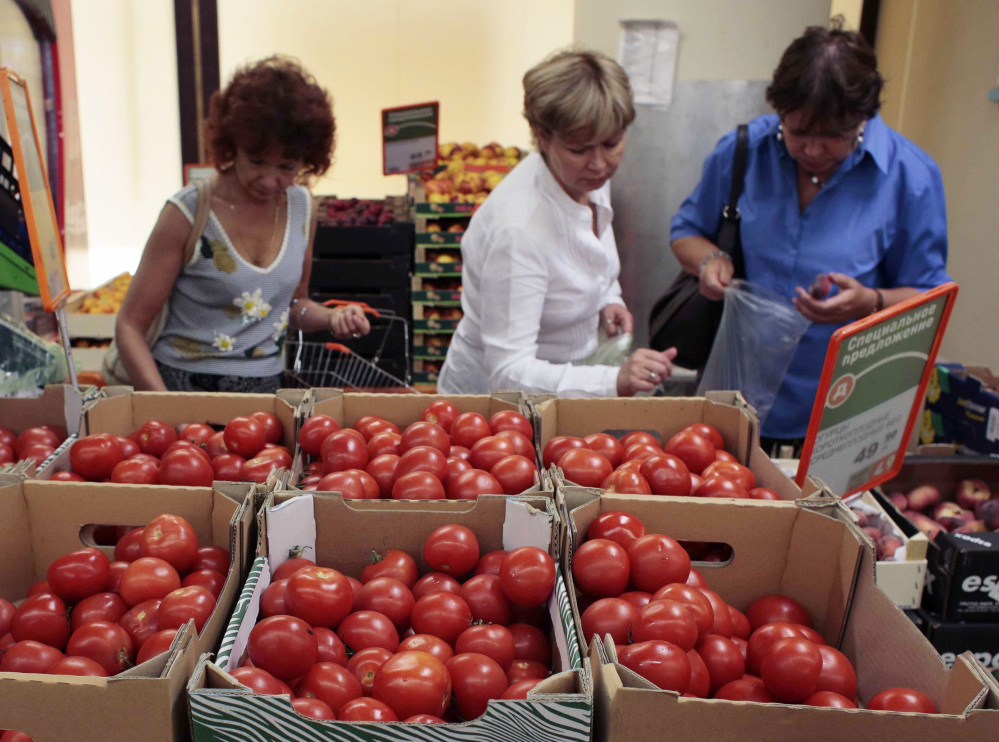MOSCOW — Russia retaliated Thursday for sanctions over the crisis in Ukraine by banning most food imports from the West, dealing a blow to Europe that also takes aim at hurting the U.S., Canada and Australia.
In choosing to make an economic move, President Vladimir Putin signaled he isn’t ready at this point to send troops into Ukraine. He also showed he’s willing to inflict significant pain on his own people to make a point.
The U.S. and the European Union have accused Russia, which annexed Ukraine’s Crimean Peninsula in March, of supplying arms and expertise to a pro-Moscow insurgency in eastern Ukraine, and have responded by slapping sanctions on Russian individuals and companies. Tensions rose further last month when a Malaysian jetliner was shot down over rebel-held territory, killing all 298 people aboard, and the West accused Russia of most likely providing the militants with the missiles that may have been used to bring the plane down.
Moscow denies supporting the rebels and accuses the West of blocking attempts at a political settlement by encouraging Kiev to use its military to crush the insurgency.
The ban, announced by a somber Prime Minister Dmitry Medvedev at a televised Cabinet meeting, covers all imports of meat, fish, fruit, vegetables, milk and milk products from the U.S. and Canada; all 28 EU countries, plus Norway; and Australia. It will last for one year.
“Until the last moment, we hoped that our foreign colleagues would understand that sanctions lead to a deadlock and no one needs them,” Medvedev said. “But they didn’t, and the situation now requires us to take retaliatory measures.”
That retaliation, however, could hurt Russia as much as the West. With the inclusion of Ukraine, most of whose food products also have been banned, Russia has now cut off 55 percent of its agricultural imports, including about 95 percent of its imported milk, cheese and yogurt.
In 2013, the EU exported $15.8 billion in agricultural goods to Russia, while the U.S. sent $1.3 billion in food and agricultural goods, including about $300 million worth of poultry. Russia accounts for about a tenth of EU agricultural exports, its second-largest market after the United States.
Washington dismissed Moscow’s ban as trivial to the U.S. but destructive to Russia’s own population.
“What the Russians have done here is limit the Russian people’s access to food,” said David Cohen, the U.S. Treasury undersecretary in charge of economic sanctions. He said the U.S. is ready to impose more sanctions against Russia if it doesn’t de-escalate the conflict in Ukraine.
Imports from the countries sanctioned Thursday not including Ukraine account for anywhere from 10 percent to 30 percent of the consumer food market.
Copy the Story LinkSend questions/comments to the editors.



Success. Please wait for the page to reload. If the page does not reload within 5 seconds, please refresh the page.
Enter your email and password to access comments.
Hi, to comment on stories you must . This profile is in addition to your subscription and website login.
Already have a commenting profile? .
Invalid username/password.
Please check your email to confirm and complete your registration.
Only subscribers are eligible to post comments. Please subscribe or login first for digital access. Here’s why.
Use the form below to reset your password. When you've submitted your account email, we will send an email with a reset code.